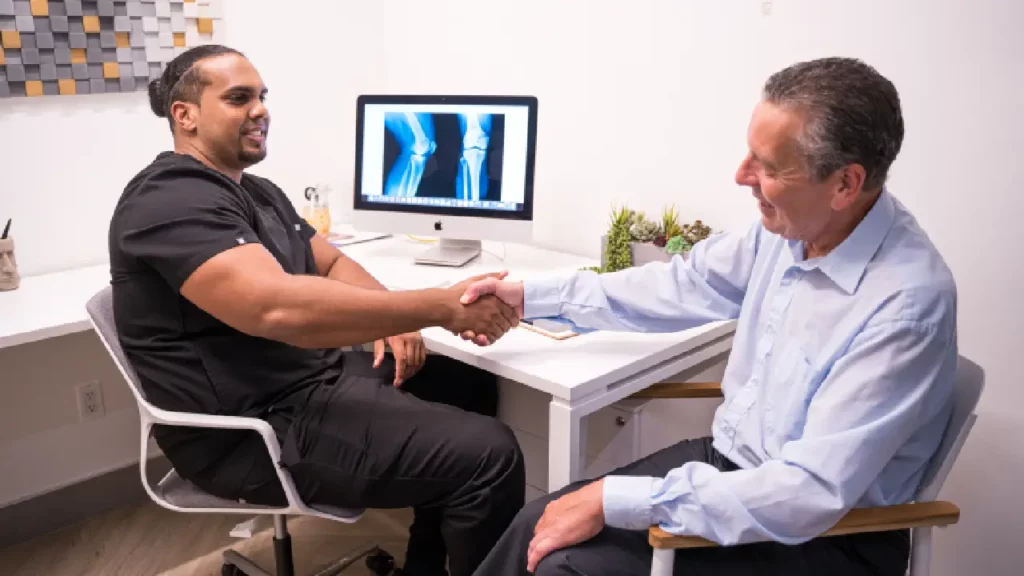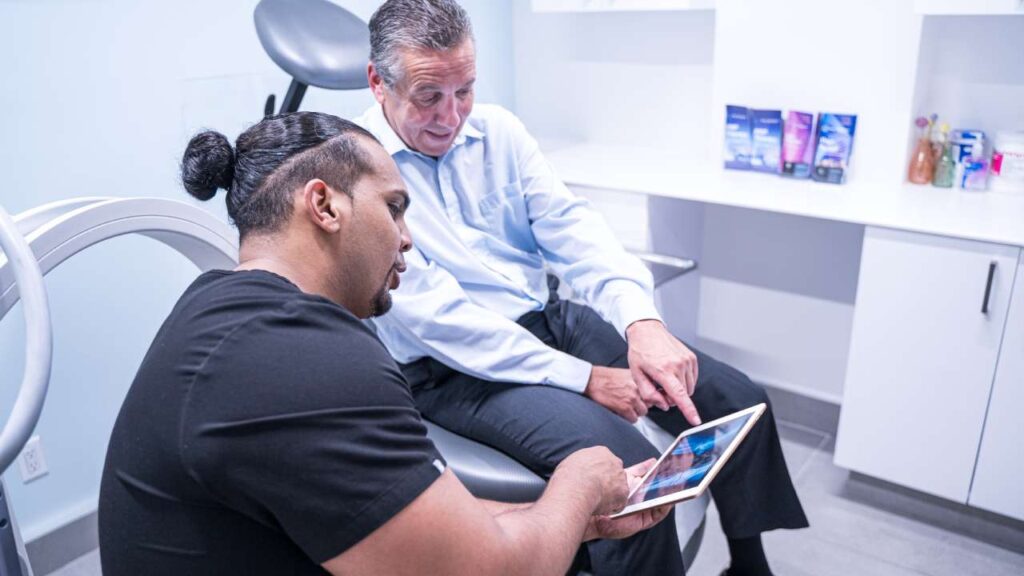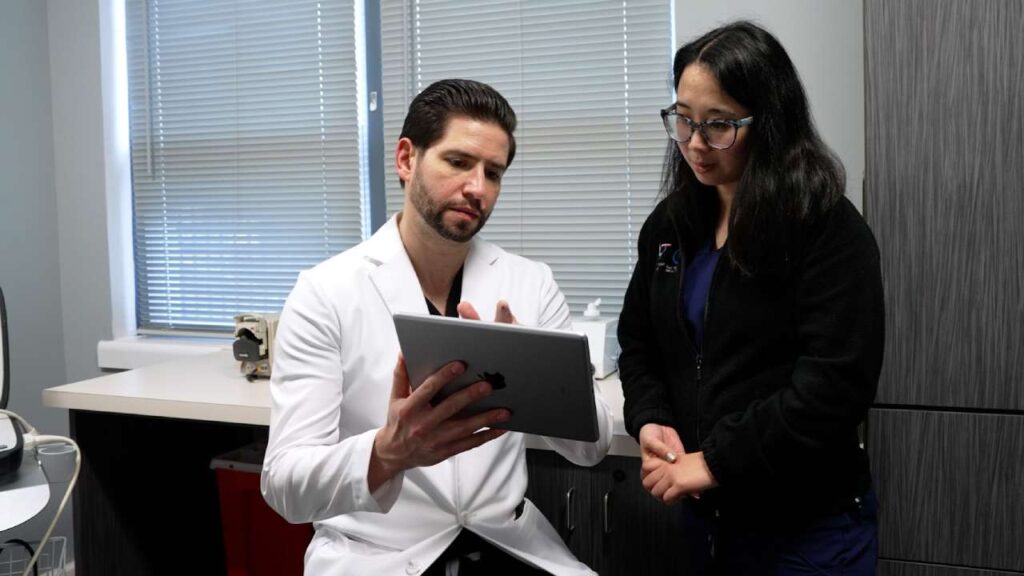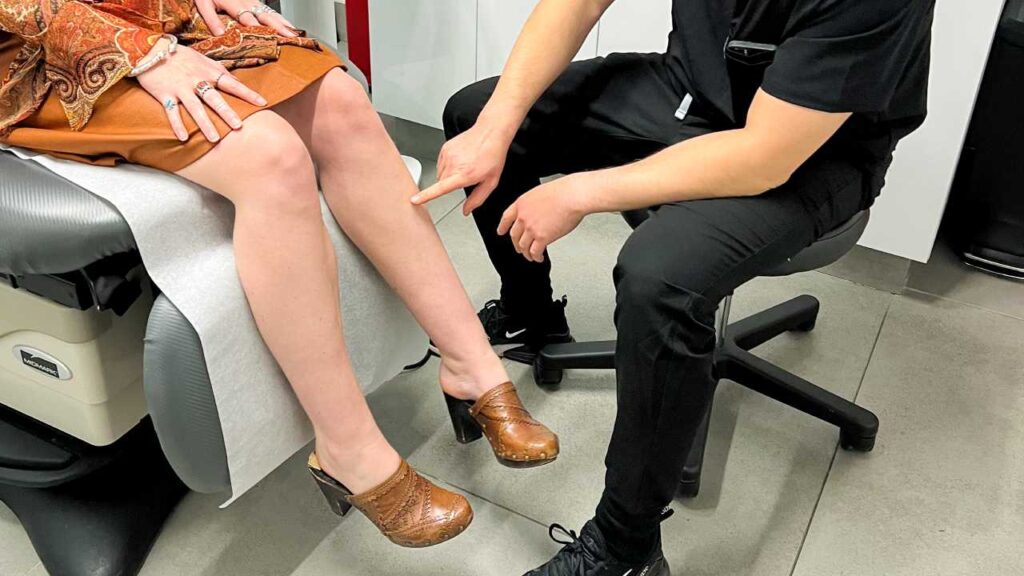Treat Venous Insufficiency in Harrison, NJ: New Vein Clinic
The best way to treat venous insufficiency involves a combination of lifestyle changes and minimally invasive vein treatments. Here’s a quick summary of what you can do:
- Diagnose the root cause through a duplex ultrasound.
- Minimally invasive treatments
- Compression therapy to manage symptoms and improve circulation.
Have you noticed a heaviness or aching feeling in your legs, especially after standing for extended periods? Maybe you’ve seen swollen veins bulging out of your skin, or perhaps you’ve even noticed skin discoloration or sores near your ankles. These are all signs of chronic venous insufficiency, a common condition that affects the veins in your legs. Left untreated, venous insufficiency can worsen, leading to more severe symptoms and complications.
Luckily, Vein Clinics NJ has opened a brand-new location in Harrison, NJ, to help you treat venous insufficiency and its related conditions. Located at 620 Essex St, Harrison, NJ 07029, our state-of-the-art vein clinic offers effective, minimally invasive treatments for varicose veins, spider veins, and other symptoms associated with chronic venous insufficiency. If you’re dealing with these symptoms, it’s time to get the care you deserve.
What is Chronic Venous Insufficiency?
Chronic venous insufficiency (CVI) is when your veins fail to pump blood efficiently back to your heart, leading to poor circulation in your lower extremities. The veins in your legs have one-way valves that ensure blood flows in the right direction. When these valves become weak or damaged, blood begins to pool in the veins, causing them to enlarge and become varicose. CVI can lead to discomfort, pain, and a range of more severe health issues if left untreated.
Here are some key facts after CVI:
- CVI is caused by weakened or damaged vein valves.
- Blood pools in the veins, causing swelling and varicose veins.
- CVI can lead to poor circulation and discomfort in the legs.
- Symptoms worsen over time if left untreated.
What Are the Signs and Symptoms of Venous Insufficiency?
The signs and symptoms of venous insufficiency can vary, but they often involve discomfort in the legs. Here’s what to watch out for:
- Swelling in the legs and ankles, especially after standing.
- Pain, aching, or cramping in the legs.
- Visible varicose or spider veins.
- Skin discoloration or ulcers near the ankles.
- Heaviness or tiredness in the legs.
- Itchy or dry skin over the affected veins.
- Restless legs, especially at night.
What Are the Possible Complications of Untreated Venous Insufficiency?
When venous insufficiency is left untreated, it can lead to more serious complications. Here’s what you should know about the risks:
- Ulcers may develop on the skin, usually near the ankles.
- Chronic swelling can lead to skin changes and discoloration.
- Blood clots may form, causing deep vein thrombosis (DVT).
- Varicose veins can worsen, leading to more severe symptoms.
- Increased risk of skin infections or cellulitis.
- Pain and swelling can interfere with daily activities.
What Is the Best Treatment for Venous Insufficiency?
At Vein Clinics NJ, Dr. Jeffrey Deygoo specializes in diagnosing venous insufficiency and creating personalized treatment plans tailored to your needs. Through a combination of advanced diagnostics, such as duplex ultrasound, and minimally invasive procedures, Dr. Deygoo can target the root cause of your symptoms. After a thorough evaluation, he will recommend the most appropriate treatment options for your condition.
These are some of the venous insufficiency treatments we offer:
- Endovenous Laser Ablation (EVLA): Endovenous Laser Ablation (EVLA) uses laser energy to treat larger varicose veins and underlying venous insufficiency. During EVLA, a small laser fiber is inserted into the affected vein. The heat from the laser causes the vein to collapse, redirecting blood flow to healthier veins. This procedure is effective, minimally invasive, and has a quick recovery time.
- VenaSeal: VenaSeal is a newer treatment for venous insufficiency that uses a medical adhesive to seal off the affected veins. This procedure is highly effective for larger veins and involves no incisions or stitches, making it a convenient option for patients seeking minimal downtime.
- ClariVein: ClariVein is a combination of mechanical and chemical techniques that treat larger veins. The catheter used during the procedure combines a rotating motion with a sclerosant solution, effectively sealing the veins and improving blood flow. It’s highly effective for those with larger veins and has a very low risk of complications.
- Ambulatory Phlebectomy: For larger varicose veins that cannot be treated with non-surgical methods, ambulatory phlebectomy is an option. During this procedure, the affected veins are removed through tiny incisions in the skin. This is often combined with other treatments for comprehensive vein care.
- Sclerotherapy: Sclerotherapy is one of the most popular treatments for spider veins. During this procedure, a solution is injected into the vein, causing it to collapse and eventually be absorbed by the body. It’s minimally invasive, quick, and effective for treating veins that are visible on the surface.
At Vein Clinics NJ, located at 620 Essex St, Harrison, NJ 07029, we offer cutting-edge treatments for venous insufficiency. Our team, led by experts like Dr. Jeffrey Deygoo, is committed to providing you with personalized care and the latest minimally invasive treatments. Contact us to schedule a consultation and explore your vein treatment options.






